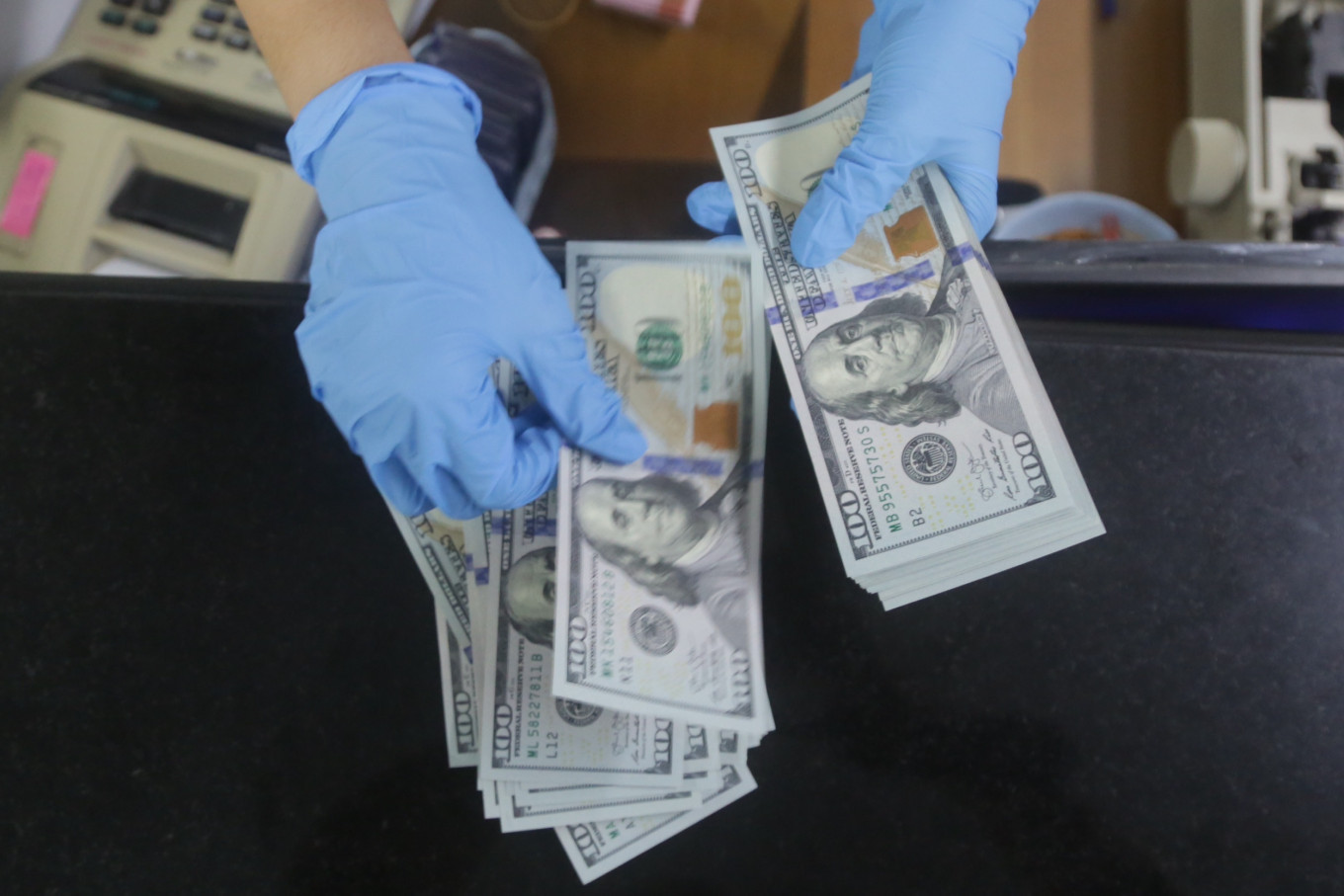Popular Reads
Top Results
Can't find what you're looking for?
View all search resultsPopular Reads
Top Results
Can't find what you're looking for?
View all search resultsBank Indonesia expects forex reserves to increase to $125b
The rupiah was trading at Rp 15,880 to the dollar at 3:16 p.m. Jakarta time, up 2.28 percent from the previous close.
Change text size
Gift Premium Articles
to Anyone
T
he rupiah exchange rate strengthened significantly against the US dollar on Thursday, allowing the central bank to reduce market intervention as it expected foreign exchange (forex) reserves to increase over this week.
The rupiah was trading at Rp 15,880 to the dollar Thursday, up 2.28 percent from the previous close, according to Bloomberg data.
Bank Indonesia (BI) governor Perry Warjiyo said the rupiah exchange rate was still undervalued even after the strong appreciation, adding that the central bank predicted the rupiah would strengthen further to 15,000 against the US dollar by the end of 2020.
“If we measure the fundamentals of the rupiah exchange rate including against inflation, the current account deficit and interest rate differentials onshore and abroad, the rupiah is still undervalued and has the tendency to strengthen," Perry said at a livestreamed media briefing on Thursday.
Read also: ‘This is not a normal time’: BI to break barriers in COVID-19 battle
Despite the jump, the rupiah remains one of the worst-performing Asian currencies as it has lost more than 14 percent of its value against the greenback so far this year after foreign investors dumped Indonesian assets following the novel coronavirus pandemic.
The central bank has stepped up intervention, especially in March, in the spot foreign exchange and domestic non-deliverable forward markets. It has bought bonds dumped by foreign investors to anchor the value of the rupiah.
Foreign investors sold Rp 148.76 trillion (US$9.35 billion) in Indonesian assets, including Rp 135.08 trillion in government bonds and Rp 9.71 trillion in stocks, BI data shows. The central bank has purchased Rp 172.5 trillion worth of government bonds, including Rp 166.2 trillion from foreign investors in the secondary market, to stabilize the currency.
“We see now that the strengthening rupiah was due to market dynamics,” Perry said. “This reduces BI’s need to intervene as our intervention has been declining recently.”
Read also: BI expects rebound in foreign capital flows later this year
On that basis, the central bank expects the country’s forex reserves to reach $125 billion this week as uncertainties surrounding financial markets start to subside.
The reserves dropped $9.4 billion in March to $121 billion as BI stepped up market intervention to stabilize the rupiah exchange rate, which was volatile throughout the month.
The government’s plan to raise funds from dollar-denominated bonds was also expected to help bulk up the country’s reserves, Perry added.
The newly enacted Presidential Regulation (Perpres) No. 54/2020 on the 2020 state budget stipulates a steep increase in debt issuance to Rp 1 quadrillion this year from the initially targeted Rp 351.9 billion as the government seeks to fund the fight against the pandemic.
The government plans to offer sovereign debt papers worth Rp 549.6 trillion, an increase from the initial Rp 389.3 trillion, while also planning to raise Rp 450 trillion in “pandemic bonds”.
The Finance Ministry has raised $4.3 billion in dollar-denominated bonds this week, which could boost the country’s forex reserves by between $4 billion and $125 billion in the next week, Perry said.
Read also: Bank Indonesia strikes $60b repo facility deal with US Fed as forex reserves drop
“The conversion of dollar-denominated bonds into rupiah-denominated funds to be used by the fiscal authority to finance stimulus would increase the central bank’s foreign exchange reserves,” economists from the University of Indonesia Institute for Economic and Social Research (LPEM UI) wrote in a research note.
According to the institution’s calculations, the issuance of Rp 450 trillion in “pandemic bonds” would increase the central bank’s foreign reserves by $15 billion if the debt papers were denominated in dollars.
“Meanwhile, if all the pandemic bonds are denominated in rupiah, then the increase of foreign reserves will only reach $9 billion,” the researchers said.










